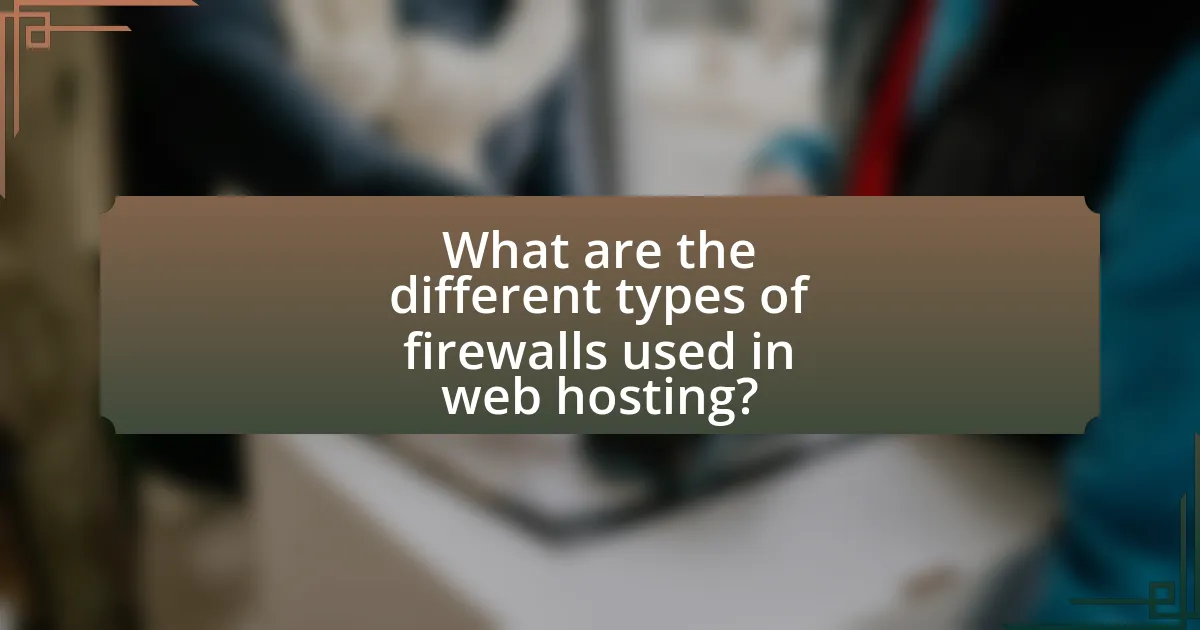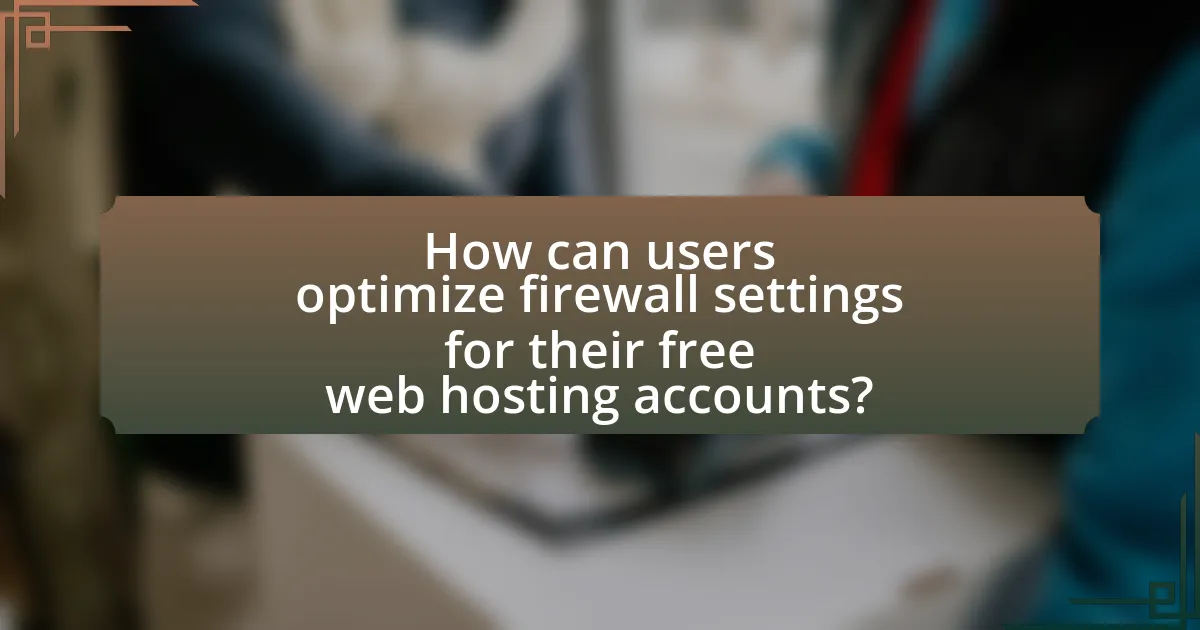Firewalls are essential tools for protecting free web hosting accounts by monitoring and controlling network traffic to prevent unauthorized access and cyber threats. They defend against various risks, including malware, denial-of-service attacks, and data breaches, by filtering traffic based on predetermined security rules. The article explores the different types of firewalls, their functionalities, and the specific vulnerabilities faced by free web hosting services. Additionally, it discusses best practices for configuring firewalls, optimizing settings, and monitoring their effectiveness to enhance security for users of free web hosting platforms.

What is the Role of Firewalls in Safeguarding Free Web Hosting Accounts?
Firewalls play a crucial role in safeguarding free web hosting accounts by monitoring and controlling incoming and outgoing network traffic based on predetermined security rules. They act as a barrier between trusted internal networks and untrusted external networks, preventing unauthorized access and potential attacks. For instance, firewalls can block malicious traffic, such as Distributed Denial of Service (DDoS) attacks, which are common threats to web hosting services. According to a report by Cybersecurity Ventures, cybercrime is projected to cause damages of $10.5 trillion annually by 2025, highlighting the importance of robust firewall protection for web hosting accounts.
How do firewalls protect free web hosting accounts?
Firewalls protect free web hosting accounts by monitoring and controlling incoming and outgoing network traffic based on predetermined security rules. They act as a barrier between trusted internal networks and untrusted external networks, preventing unauthorized access and potential attacks. For instance, firewalls can block malicious traffic, such as DDoS attacks, which are common threats to web hosting services. According to a report by Cybersecurity Ventures, cybercrime is projected to cost the world $10.5 trillion annually by 2025, highlighting the importance of firewalls in mitigating such risks. By filtering traffic and enforcing security policies, firewalls significantly enhance the security posture of free web hosting accounts.
What types of threats do firewalls defend against?
Firewalls defend against various types of threats, including unauthorized access, malware, denial-of-service attacks, and data breaches. Unauthorized access occurs when malicious actors attempt to exploit vulnerabilities to gain entry into a network. Firewalls monitor incoming and outgoing traffic, blocking suspicious activities that could lead to such breaches. Malware, which includes viruses and ransomware, is often delivered through untrusted sources; firewalls can filter this traffic to prevent infection. Denial-of-service attacks aim to overwhelm a network, rendering it unusable; firewalls can detect and mitigate these attacks by limiting excessive requests. Lastly, data breaches involve the unauthorized extraction of sensitive information, and firewalls help protect against this by enforcing strict access controls and monitoring data flows.
How do firewalls monitor and filter traffic?
Firewalls monitor and filter traffic by analyzing data packets as they enter or leave a network. They utilize predefined security rules to determine whether to allow or block specific traffic based on criteria such as IP addresses, protocols, and port numbers. For instance, a firewall may block incoming traffic from known malicious IP addresses while allowing legitimate requests, thereby protecting the network from unauthorized access and potential threats. This functionality is supported by various firewall types, including packet-filtering firewalls, stateful inspection firewalls, and application-layer firewalls, each employing different methods to ensure comprehensive traffic management and security.
Why are firewalls essential for free web hosting accounts?
Firewalls are essential for free web hosting accounts because they provide a critical layer of security that protects against unauthorized access and cyber threats. Free web hosting services often lack robust security measures, making them attractive targets for hackers. Firewalls monitor and control incoming and outgoing network traffic based on predetermined security rules, effectively blocking malicious activities. For instance, a study by the Cybersecurity & Infrastructure Security Agency (CISA) indicates that organizations with firewalls in place can reduce the risk of data breaches by up to 80%. This statistic underscores the importance of firewalls in safeguarding sensitive information and maintaining the integrity of free web hosting accounts.
What vulnerabilities do free web hosting accounts face?
Free web hosting accounts face several vulnerabilities, including limited security measures, lack of support, and exposure to malware. These accounts often do not implement robust security protocols, making them susceptible to attacks such as SQL injection and cross-site scripting. Additionally, the absence of dedicated technical support can delay response times to security incidents, increasing the risk of data breaches. Research indicates that free hosting services are frequently targeted by cybercriminals due to their lower security standards, with a significant percentage of compromised websites originating from such platforms.
How do firewalls enhance security for users of free web hosting services?
Firewalls enhance security for users of free web hosting services by monitoring and controlling incoming and outgoing network traffic based on predetermined security rules. This protective measure helps to prevent unauthorized access, data breaches, and various cyber threats that can exploit vulnerabilities in free hosting environments. For instance, according to a report by Cybersecurity Ventures, cybercrime is projected to cost the world $10.5 trillion annually by 2025, highlighting the critical need for robust security measures like firewalls. By filtering malicious traffic and blocking harmful requests, firewalls significantly reduce the risk of attacks such as Distributed Denial of Service (DDoS) and SQL injection, thereby safeguarding user data and maintaining service availability.

What are the different types of firewalls used in web hosting?
The different types of firewalls used in web hosting include network firewalls, application firewalls, and next-generation firewalls. Network firewalls monitor and control incoming and outgoing network traffic based on predetermined security rules, effectively protecting the server from unauthorized access. Application firewalls, on the other hand, filter traffic to and from web applications, providing a more granular level of security by inspecting the data packets at the application layer. Next-generation firewalls combine traditional firewall capabilities with advanced features such as intrusion prevention systems and deep packet inspection, offering enhanced protection against sophisticated threats. These types of firewalls are essential in safeguarding free web hosting accounts by preventing data breaches and ensuring the integrity of hosted websites.
How do hardware firewalls differ from software firewalls?
Hardware firewalls differ from software firewalls primarily in their deployment and functionality. Hardware firewalls are physical devices that sit between a network and its gateway, providing a dedicated layer of security that can filter traffic before it reaches the internal network. In contrast, software firewalls are applications installed on individual devices, monitoring and controlling incoming and outgoing traffic based on predetermined security rules.
The distinct nature of hardware firewalls allows them to manage traffic for multiple devices simultaneously, making them suitable for larger networks, while software firewalls are typically limited to the device they are installed on. Additionally, hardware firewalls often offer more robust performance and can handle higher volumes of traffic without degrading system performance, as they operate independently of the devices they protect. This is supported by the fact that hardware firewalls can include advanced features such as intrusion detection systems and virtual private network (VPN) support, which are less common in software firewalls.
What are the advantages of using hardware firewalls for web hosting?
Hardware firewalls provide enhanced security for web hosting by acting as a barrier between the internal network and external threats. They offer advantages such as robust protection against DDoS attacks, which can overwhelm servers and disrupt services. Additionally, hardware firewalls can inspect incoming and outgoing traffic in real-time, allowing for the detection and blocking of malicious activities before they reach the web hosting environment. Furthermore, they often include features like VPN support and advanced filtering options, which can help secure sensitive data and improve overall network performance. These capabilities make hardware firewalls a critical component in safeguarding free web hosting accounts from various cyber threats.
What are the limitations of software firewalls in this context?
Software firewalls have several limitations in the context of safeguarding free web hosting accounts. Primarily, they can only monitor and control traffic on the device they are installed on, leaving network-wide threats unaddressed. Additionally, software firewalls may not effectively protect against sophisticated attacks such as Distributed Denial of Service (DDoS), which can overwhelm a server regardless of individual device protections. Furthermore, they often require regular updates and configuration adjustments to remain effective, which can be a challenge for users of free web hosting services who may lack technical expertise. Lastly, software firewalls can consume system resources, potentially degrading the performance of the hosting environment, which is critical for maintaining service quality in free hosting scenarios.
What role do cloud-based firewalls play in web hosting security?
Cloud-based firewalls serve as a critical layer of security in web hosting by filtering and monitoring incoming and outgoing traffic to prevent unauthorized access and cyber threats. They protect web hosting environments from attacks such as Distributed Denial of Service (DDoS), malware, and data breaches by analyzing traffic patterns and blocking malicious requests in real-time. According to a report by Cybersecurity Ventures, global cybercrime damages are projected to reach $10.5 trillion annually by 2025, highlighting the necessity of robust security measures like cloud-based firewalls in safeguarding web hosting accounts.
How do cloud-based firewalls improve scalability and flexibility?
Cloud-based firewalls enhance scalability and flexibility by allowing organizations to easily adjust their security resources based on demand. This adaptability is achieved through the cloud’s on-demand infrastructure, which enables rapid provisioning and de-provisioning of firewall services without the need for physical hardware changes. For instance, during peak traffic periods, businesses can scale up their firewall capabilities to handle increased loads, ensuring consistent performance and security. Conversely, during low-traffic times, they can scale down, optimizing costs. This dynamic resource management is supported by cloud providers that offer elastic services, allowing for seamless integration and deployment across various environments, thus reinforcing the firewall’s role in safeguarding web hosting accounts effectively.
What are the potential drawbacks of relying on cloud-based firewalls?
Relying on cloud-based firewalls can lead to several potential drawbacks, including dependency on internet connectivity, which can result in service disruptions during outages. Additionally, cloud-based firewalls may introduce latency due to data transmission over the internet, potentially affecting application performance. Security concerns also arise, as sensitive data is transmitted to and from the cloud, increasing exposure to interception or breaches. Furthermore, compliance with data protection regulations can be challenging, as organizations must ensure that cloud providers meet necessary legal standards. These drawbacks highlight the importance of evaluating cloud-based firewall solutions in the context of specific organizational needs and risks.

How can users optimize firewall settings for their free web hosting accounts?
Users can optimize firewall settings for their free web hosting accounts by configuring rules that allow only necessary traffic while blocking unwanted access. This involves setting up specific inbound and outbound rules to permit traffic from trusted IP addresses and services, while denying all other connections. Additionally, users should regularly review and update these rules based on their website’s traffic patterns and security needs, ensuring that only essential ports are open, such as HTTP (port 80) and HTTPS (port 443). Regular monitoring of firewall logs can also help identify and respond to potential threats, reinforcing the security of the hosting environment.
What best practices should users follow when configuring firewalls?
Users should follow several best practices when configuring firewalls to ensure optimal security. First, users must implement a default-deny policy, allowing only necessary traffic while blocking all other connections. This approach minimizes exposure to potential threats. Additionally, users should regularly update firewall rules and firmware to protect against newly discovered vulnerabilities, as outdated systems can be easily exploited.
Furthermore, users should conduct regular audits of firewall configurations to identify and rectify any misconfigurations or unnecessary open ports. Logging and monitoring traffic is also essential, as it enables users to detect suspicious activities and respond promptly. Finally, users should segment networks to limit access to sensitive information, thereby reducing the risk of unauthorized access. These practices collectively enhance the effectiveness of firewalls in safeguarding free web hosting accounts.
How can users regularly update firewall rules to enhance security?
Users can regularly update firewall rules to enhance security by implementing a scheduled review process and utilizing automated tools. Establishing a routine, such as monthly or quarterly reviews, allows users to assess and modify rules based on emerging threats or changes in network architecture. Automated tools can assist in monitoring traffic patterns and suggesting rule adjustments, ensuring that the firewall adapts to new vulnerabilities. According to a study by the SANS Institute, organizations that regularly update their firewall configurations reduce the risk of breaches by up to 30%. This proactive approach not only strengthens security but also aligns with best practices in cybersecurity management.
What common mistakes should users avoid when setting up firewalls?
Users should avoid the mistake of using overly permissive rules when setting up firewalls, as this can expose systems to unnecessary risks. Many users fail to implement the principle of least privilege, allowing too much access to services and applications, which can lead to vulnerabilities. Additionally, neglecting to regularly update firewall rules and configurations can leave systems open to new threats, as cyber threats evolve over time. Another common error is not logging or monitoring firewall activity, which prevents users from detecting and responding to potential security incidents effectively. Lastly, users often overlook the importance of testing firewall configurations, which can result in misconfigurations that compromise security.
What tools and resources are available for monitoring firewall effectiveness?
Tools and resources available for monitoring firewall effectiveness include network monitoring software, intrusion detection systems, and firewall management tools. Network monitoring software, such as SolarWinds and PRTG Network Monitor, provides real-time insights into traffic patterns and alerts administrators to unusual activity. Intrusion detection systems like Snort analyze network traffic for suspicious behavior, enhancing the firewall’s protective capabilities. Firewall management tools, such as Fortinet’s FortiAnalyzer, offer detailed reporting and analytics on firewall performance and security incidents. These tools collectively enable organizations to assess and improve their firewall effectiveness, ensuring robust protection for free web hosting accounts.
How can users assess the performance of their firewalls?
Users can assess the performance of their firewalls by monitoring key metrics such as throughput, latency, and the number of blocked threats. Throughput measures the amount of data processed by the firewall, while latency indicates the delay introduced by the firewall in data transmission. Additionally, analyzing logs for blocked threats provides insight into the firewall’s effectiveness in preventing unauthorized access. Regularly conducting performance tests, such as stress testing and vulnerability assessments, further validates the firewall’s operational efficiency. These methods ensure that the firewall is functioning optimally to protect free web hosting accounts from potential security breaches.
What metrics should users track to ensure optimal firewall protection?
Users should track metrics such as the number of blocked intrusion attempts, the types of traffic being filtered, and the frequency of security updates to ensure optimal firewall protection. Monitoring the number of blocked intrusion attempts provides insight into potential threats, while analyzing the types of traffic helps identify patterns that may indicate vulnerabilities. Additionally, keeping track of security updates ensures that the firewall is equipped with the latest protections against emerging threats, as outdated systems are more susceptible to attacks.
What are the common troubleshooting steps for firewall issues in web hosting?
Common troubleshooting steps for firewall issues in web hosting include checking firewall rules, verifying server logs, testing connectivity, and ensuring proper configuration of ports. First, administrators should review the firewall rules to confirm that they allow necessary traffic for web hosting services. Next, examining server logs can reveal blocked requests or errors that indicate misconfigurations. Testing connectivity using tools like ping or traceroute helps identify if the firewall is obstructing access. Lastly, confirming that the correct ports are open and properly configured is essential, as many web hosting services require specific ports to function correctly. These steps are critical for diagnosing and resolving firewall-related issues effectively.
